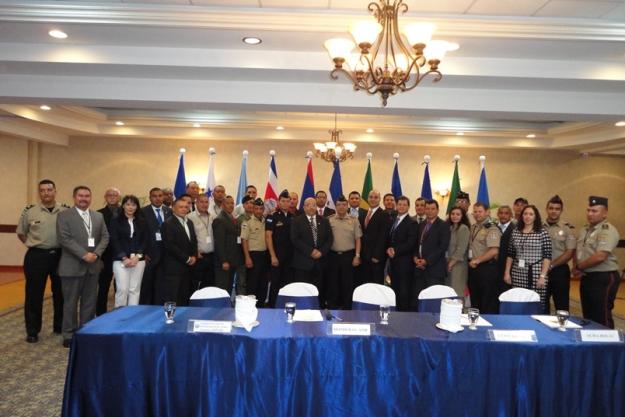
Participants at the Sub Regional Table Top Exercise in Chemical Emergency Response for States Parties from Central America and Mexico held in Tegucigalpa, Honduras.
A Table Top Exercise in Chemical Emergency Response for States Parties of Central America and Mexico was held from 7 to 9 April 2015 in the city of Tegucigalpa, Honduras. The exercise was jointly organised by the Technical Secretariat of the OPCW and the National Authority of Honduras to the CWC in close cooperation with the Honduran Firefighters Corps. Twenty three first-responders and instructors from eleven States Parties of the Sub Region, Brazil and Mexico, attended the course*.
Issues related to coordination with regional and sub-regional organisations with mandates relevant to Article X of the Chemical Weapons Convention, as recommended by the Third Review Conference, were debated during the first day of the exercise. To that end, representatives of the Regional Office for Latin America and the Caribbean of the UN Office for Coordination of Humanitarian Affairs (UN OCHA), the Central American Platform for the coordination of disaster management mechanisms (CEPREDENAC), the Honduran emergency management agency, (COPECO), the Guatemalan emergency management agency (CONRED) and the National Centre for Disaster Prevention (CENAPRED) from Mexico addressed the participants. This exercise corresponds to the third stage of a project designed for Central American States and Mexico, aimed at establishing and improving the protective capabilities of those States Parties against chemical weapons and incidents with TICs.
The exercise provided an opportunity to practice and test the skills of participants and their knowledge in emergency response coordination. It was prepared and facilitated by experts from Costa Rica, Guatemala and Peru, as a part of the instructor exchange programme that has been put in practice since 2013 by the Technical Secretariat. The exercise enjoyed wide acceptance amongst the participating States Parties and served as an effective platform for active knowledge sharing and information exchange.
* Belize, Brazil , Costa Rica, Honduras, El Salvador, Guatemala, Mexico, Nicaragua, Panama, Peru and the Dominican Republic
